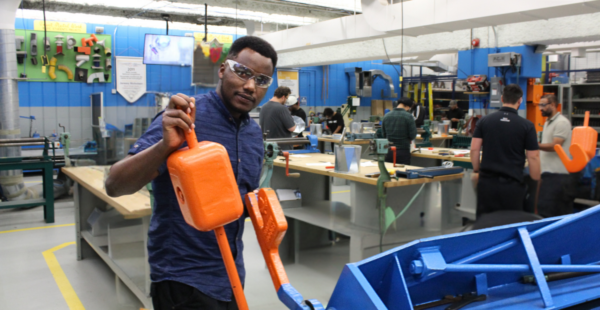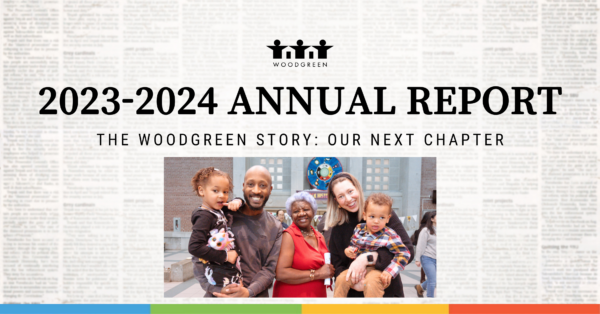Change: it can be something that happens to you, but also something you actively do. Right now, the ways in which Canadians work, find jobs and gain skills for employment are all changing. These transformations are leading to challenges for many in our community. That’s why WoodGreen has an eye to the future when helping its clients through our Employment Services.
“The things that influence the future of work are astonishingly broad,” says Sonya Goldman, Director of Employment and Skills Development at WoodGreen. "That has made us realize that we need to get very specific about helping individual people in a very individual way.”
Are you looking for a new job?
Our job coaches can support you.
What’s Driving the Change?
Many of the factors driving change in the world of work have been on the radar for a while. The pandemic, however, kicked a few of these trends into warp speed. Let’s examine a few of those factors:
Automation
One of the biggest trends influencing how Canadians work is automation. This includes things like artificial intelligence (AI) and digital transformations of labour. A new report by the OECD finds 27 per cent of workers are in jobs at risk of being lost to an AI revolution. Research suggests industries with high concentrations of racialized minority and immigrant workers, such as the service and retail industries, will be greatly transformed. Entry-level jobs are also where young workers gain skills, which they need to help advance in their careers.
The Digital Economy
Quickly becoming a major driver of economic and employment growth, digital technology underpins virtually every sector in the Canadian economy. Its highly-skilled, high-wage, private-sector jobs are particularly important in Toronto, where one in every 10 workers is in a digital tech job, the highest concentration in the country. Toronto now ranks third in North America as a Top Tech Talent market (behind San Francisco and Seattle).
Gig Work
The fastest-growing labour group in Canada is self-employed, temporary workers. Even before the pandemic, ‘gig work’ (short-term, task-based jobs) was on the rise, doubling its percentage of the workforce in just 15 years. In Toronto, one in every 10 workers is now part of the gig economy. Although gig work provides flexibility, it also removes many workers’ rights, access to benefits and puts them at increased competition from international labour.
Green Jobs
The climate crisis has catapulted the green economy to the forefront of change in Canada’s labour market, where it is often identified as a “sector of the future”. It’s estimated 15% of the existing workforce will see their jobs disrupted by a transition to a greener economy, while 13% of new job descriptions will be different because of the green transition.
See our current employment programs.
 Changing How We Find &
Changing How We Find &
Apply For Jobs
The days are long gone when workers looked for jobs in a newspaper’s “Help Wanted” section. Open positions can be both difficult to find and apply for, especially for older workers or newcomers.
Job postings are almost exclusively online, meaning applicants must have computer and literacy skills, as well as access to that technology in order to even begin to find work. That’s just the beginning of a hiring process which is increasingly virtual.
Those who navigate the application process aren’t likely to have their resume viewed by a human, with 90% of companies using some form of Applicant Tracking Software, or AI bots, to filter candidates.
In the event the bot selects the applicant, any interview is very likely to be an on-camera, virtual one, with nearly half of all companies opting for virtual over in-person interviews. Once reserved for primarily white-collar positions, employers increasingly expect candidates to have an online presence on platforms like LinkedIn, where hiring managers expect to find more information about the prospective hire.

How WoodGreen is Helping Workers Adapt
WoodGreen is tackling these challenges with an intentionally calculated and deeply-researched tri-fold approach.
“WoodGreen’s role is to help those who are furthest from the labour market,” says Goldman, “so we are now — really more than ever — trying to orient our programs to be population-specific.”
The goal, she says, is to ensure that services focus on how best to help newcomers, youth, persons with disabilities, and older workers prepare for and secure meaningful work.
Secondly, WoodGreen focuses on the employer component; which industries are hiring, what are they looking for and what they need to hire the people WoodGreen is trying to help find work.
“When you're trying to solve a problem of making a whole group of people more employable, just making them qualified is not the threshold,” says Goldman. “Making them employable really means making them competitive.”
“Trying to figure out how to make someone competitive requires a new kind of approach; one at a time, opportunity at a time, person by person, job by job, employer by employer, sector by sector.”
Thirdly, Goldman says WoodGreen is pivoting its operations to “provide individualized high-quality journeys through our services that specifically meet the needs of that person very quickly and very effectively and get them to their next step, which is hopefully a job.”
 Prepared for the Future
Prepared for the Future
WoodGreen recently worked with the province studying what older workers who have left the workforce, often involuntarily, need to feel confident in finding a job.
“Often, they're not competitive enough to be employable and have lost confidence. They lack the digital skills, they feel like they belong to a different time in a different place and they don't know how to get back to work.”
Based on that research, WoodGreen developed a curriculum where older workers are being supported by job coaches and going to workshops geared to those aged 45 and up. Goldman says the formula has proven effective.
“We found that, for this group, where peer support and social isolation was so big, that sending them off together, five of them at a time, to go work at the same company where the company hires them on the same day, trains at the same time, puts them on the floor together, it made a huge difference to their success.”
Responding to changing needs
WoodGreen has also developed programs geared to helping newcomers become competitive and employable as quickly as possible. The Enhanced Language Training program is targeted at internationally-trained newcomer professionals. The three-month program offers sector-specific language training and job search preparation as well as coaching in Canadian workplace culture.
In keeping with its goal of establishing tailored, successful paths to employment, WoodGreen also runs a popular VFX program. The 23-week program is designed to train black youth ages 21 to 29 in the skills required to launch a lucrative career in digital VFX, one of the areas in which great change is underway for the future of work in Canada.
WoodGreen is continually developing programs and services that respond to the changing needs of its clients, employers and a world of work that is very quickly leading Canada into a new age of employment. To see which WoodGreen services might best help you secure your best future, visit our website.






